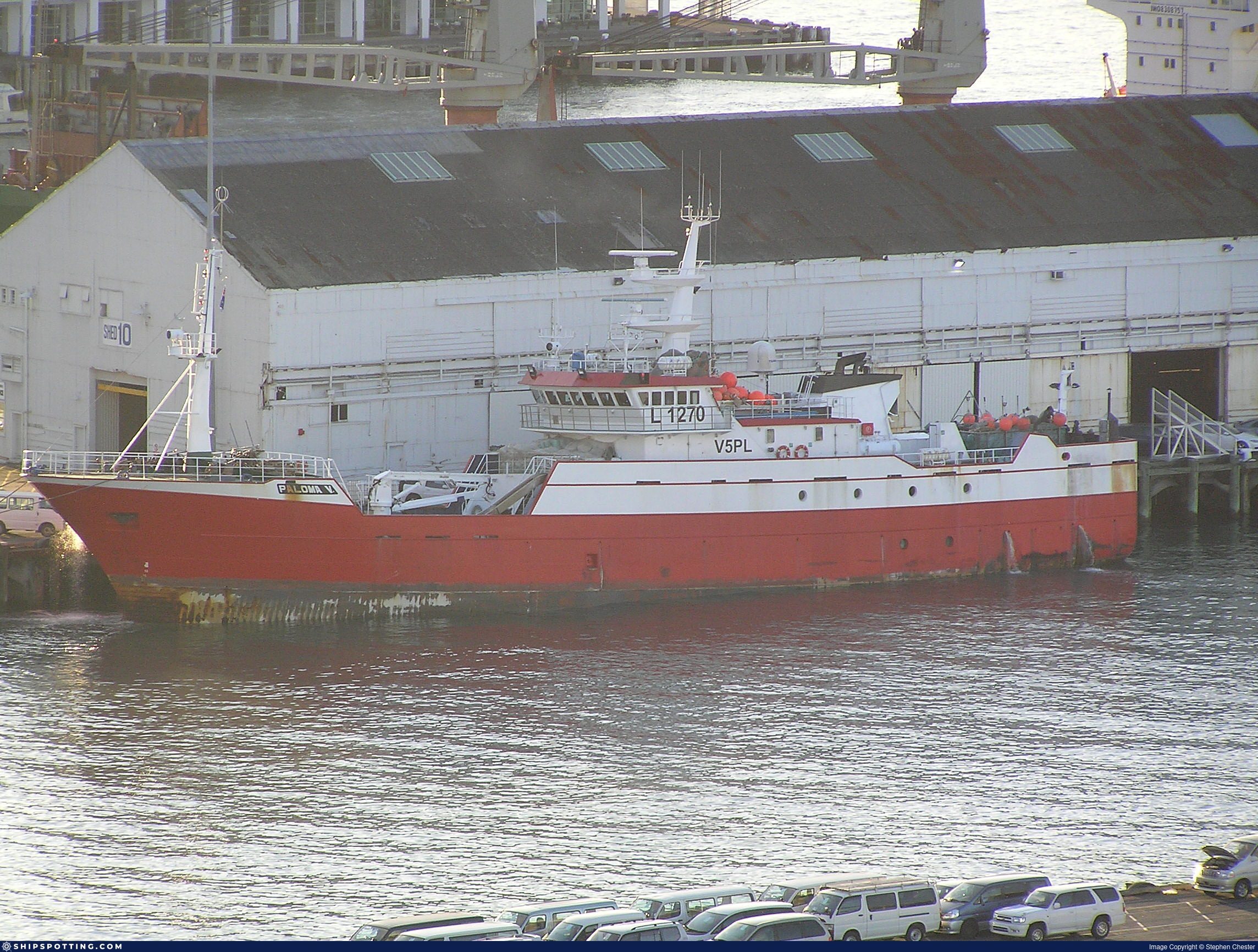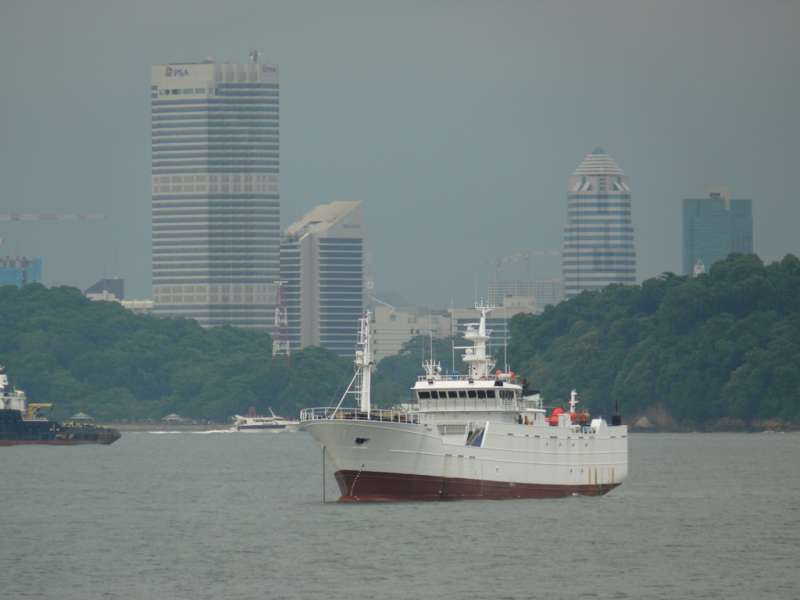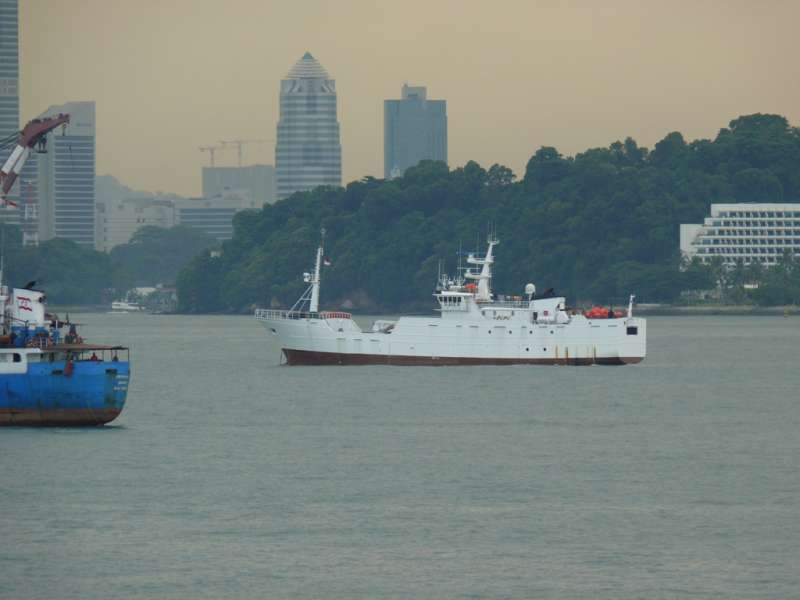
®
SHIPSPOTTING.COM
WELCOME TO SHIPSPOTTING.COM
Paloma V - IMO 9319856
Photo
details
Photographer:Stephen Chester [ View profile ]
Title:Paloma V
Photo Category:Fishing Vessel Loa 70ft/21m And Over
Added:May 16, 2008
Views:3,585
Image Resolution:2,288 x 1,712
Description:
Arrived at Auckland 16th May 2008 from Uruguay for bunkers and stores.
GROSS TONNAGE 1.016 tons
SUMMER DWT 641 tons
BUILD 2004
BUILDER ASTILLEROS ARMON NAVIA - SPAIN
FLAG CAMBODIA
CLASS SOCIETY BUREAU VERITAS
MANAGER/OWNER EASTERN HOLDING CAMBODIA
2009 May 10 renamed TROSKY
Vessel
particulars
Current name:YANGZI HUA 44
Current flag:Mongolia
Home port:Ulan Bator
Vessel Type:Fishing Vessel
Gross tonnage:1,016 tons
Summer DWT:641 tons
Photos:3 photos by 2 photographers
AIS Position
of this ship
There is no AIS Position Data available for this ship!
Would you like to add AIS Coverage?

Photo
Categories
This ship exists in the following categories:
Fishing vessel loa 70ft/21m and over - 3 photos
Photographers
of this ship
(2)
2 photos
1 photos






COMMENT THIS PHOTO(2)
http://iuu-vessels.org/iuu/iuu/vessel?uid=102
Gunnar Album. www.tryggmat.no
Edit
comment
Rome, Italy — We've just presented evidence to the Fisheries Committee of the UN Food and Agricultural Organisation (FAO) that the Spanish company Vidal Armadores S. A., despite being involved in pirate fishing, received over 3.5 million Euros in Spanish government subsidies. On top of that, the company is still getting help from the Spanish government in securing contracts and licences to fish in other countries.
Pirate fishing - known by its less colourful name: illegal, unreported and unregulated (IUU) fishing - costs the world US$4 billion annually and leaves communities that depend on fish without much needed food and income.
In the Southern Pacific, pirate fishing for the prized Patagonia toothfish (also known as "sea bass") has driven the species to the brink of commercial extinction. Illegal fleets catching the remaning toothfish here are predominantly controlled by northern hemisphere transnational crime syndicates.
Off the radar
Vidal Armadores is currently running a fleet of at least five vessels in the Southern Ocean, at least three of which are blacklisted by the Commission for the Conservation of Antarctic Marine Living Resources (CCAMLR). The Commission – part of the Antarctic Treaty System - manages fishing activities in the Southern Ocean. It blacklists vessels for engaging in pirate activity or failing to respect conservation measures, and the 24 member states agree not to buy fish from blacklisted vessels.
But when a blacklisted vessel transfers its catch at sea to another ship, who is to know? In 2007, CCAMLR estimated that pirate vessels caught more than 3600 tonnes of toothfish and killed more than 8000 seabirds.
In April 2008, New Zealand inspectors documented that the Namibian-flagged Paloma V had been involved in illegal transshipments. It was blacklisted by CCAMLR as a result. The inspection revealed that the vessel was operating together with other ships in the Vidal fleet including the blacklisted North Korean-flagged Chilbo San 33 and Black Moon, as well as the Spanish-flagged Belma and Galaecia.
Despite this, Spain signed an agreement with Namibia in 2008 that gave the Belma access to Namibian fishing grounds, and has provided Vidal Armadores with other assistance in securing contracts and licenses.
Hook them and book them
We are calling on all countries participating in the Committee on Fisheries in Rome to take the evidence presented to them seriously and urgently work towards closing the loopholes that these operators use to avoid controls.
Vidal Armadores is not alone - fishing companies around the world use transshipments and loopholes to evade the law.
We need bodies like the UN FAO to support strong regulations involving the ports that these ships enter, create a global record of fishing vessels and to urgently reduce commercial fishing to a sustainable level. It is simply a matter of political will to deliver the kind of enforcement that is needed to protect the marine environment and the communities which depend upon it.
And in the case of Vidal Armadores, we want to see the Spanish government take real action to stop ocean plunder - they can start by asking for their subsidies back. Then they can prosecute any Spanish nationals that were captains or masters of the ships. Then they can revoke all Vidal Armadores' licenses and stop helping them get contracts.
Edit
comment